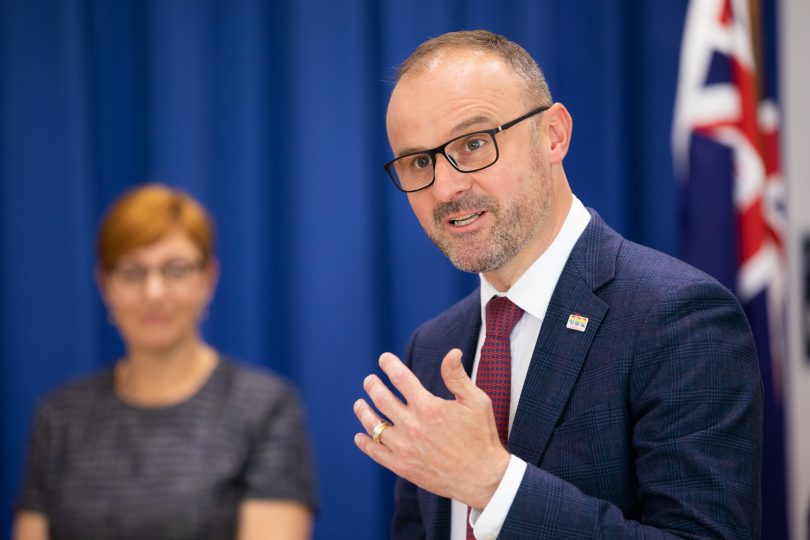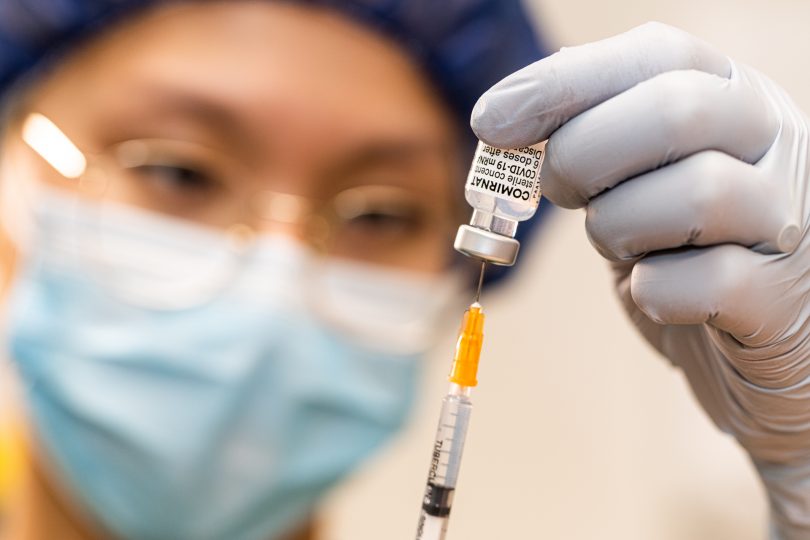
Chief Minister Andrew Barr said the mask mandate would be in place for at least another seven days. Photo: Michelle Kroll.
The ACT’s mask mandate will remain in place for at least another week while health authorities continue to closely monitor the situation in NSW, Chief Minister Andrew Barr confirmed after today’s (2 July) National Cabinet meeting.
Sydney will remain in lockdown until midnight next Friday (9 July), with some media reporting NSW Chief Health Officer Dr Kerry Chant advised her state and territory counterparts that an extension of the lockdown may be necessary.
The revelation about discussions within the Australian Health Protection Principal Committee (AHPPC) came as NSW announced an additional 31 cases today, 12 of which were in the community while infectious, and a further three that were only partially isolating while infectious.
Mirroring statements made by NSW Premier Gladys Berejiklian, Mr Barr said the number of cases likely reflect the virus circulating in the community before last Friday’s lockdown.
“We pay very close attention to what is happening in NSW every single day,” he said. “I would have preferred a lower number. I am sure everyone would have preferred a lower number.
“What will come into play in the next week is the impact of the lockdown itself.
“The numbers that you see today is really what was circulating in the community a week ago; it just takes that time for it to work its way through.”
Mr Barr said the ACT’s mask mandate would only remain in place for as long as is necessary.
“We do not intend to extend it unless we have to, but really, while Sydney is in the position that it is in, people can expect the mask mandate to stay in place,” he said.
Mr Barr has consistently indicated that he would act early and decisively if a case of community transmission were to arise in the ACT.
An outbreak of peace and harmony in the federation after a positive #NationalCabinet meeting this morning.
— Archived (@ABarrMLA) July 2, 2021
When asked if this was at odds with today’s National Cabinet statement, which said lockdowns should only be used as a last resort, Mr Barr said a decision to lock the Territory down was in line with what other jurisdictions are currently doing.
“There was very clear discussion and agreement in that what other jurisdictions have done in this period,” he said.
“That is the phase we are in now, and so we have had half the country needing to be locked down. The advice clearly is that if you go early, it often means a shorter lockdown period.”
The first of four phases will focus on vaccinating the population and continuing to suppress the virus in the community.
The second phase will then switch the focus to minimising serious illnesses, hospitalisations and deaths from the virus. Lockdowns during this phase should only be implemented in extreme circumstances, the plan says.
The last two phases would eliminate the need for lockdowns, continue vaccine booster programs and abolish caps on returning travellers.
Moving from the current phase to the second phase remained on the horizon while vaccination numbers dwindle, Mr Barr said.
While no official vaccination benchmark has been announced, somewhere between 65 to 90 per cent of the population would need to be vaccinated before progression discussions could commence.

The ACT’s allocation of Pfizer is set to double in the coming weeks. Photo: Michelle Kroll.
Around 8 per cent of Australians are fully vaccinated, according to Commonwealth Government figures.
However, “intense work” would be undertaken between the Commonwealth and state and territory governments next week to map out finer details about vaccine supply lines, Mr Barr said.
In a briefing to National Cabinet about the vaccination program, the Coordinator-General of Operation COVID Shield, Lieutenant General John Frewen, flagged the arrival of additional Pfizer stocks.
But Mr Barr said he would not factor in these additional doses until he was certain they would arrive.
“I have heard [about more vaccines] before, so I am not going to take that into our planning until I know it has arrived in the country,” he said.
Commonwealth data shows the ACT’s Pfizer allocation doubling in July and August to between 17,000 and 19,000 doses per week. This will increase to between 34,000 and 50,000 doses per week around October and December.
AstraZeneca doses will be phased out by the end of the year and will only be available upon request as a supply of the Moderna vaccine comes through, with the ACT receiving 1000 to 2000 doses a week from September.
This will then increase to between 7000 and 10,000 Moderna doses per week from October.
Mr Barr said a third Pfizer hub would be set up by the ACT Government as soon as supply became available.
“What is holding this back is supply. It is not a lack of willingness from the community,” he said.
“But I do want people to get vaccinated, and that if we do get extra supply, we will have the capacity through our own clinics and through our GP networks to be able to deliver more vaccines to more people.
“That is the priority at the moment and as soon as we get confirmation of supply, as we did with the airport clinic, we will stand up a new facility.”
More information about the ACT’s vaccine rollout can be found at www.covid19.act.gov.au.
Original Article published by Dominic Giannini on The RiotACT.




